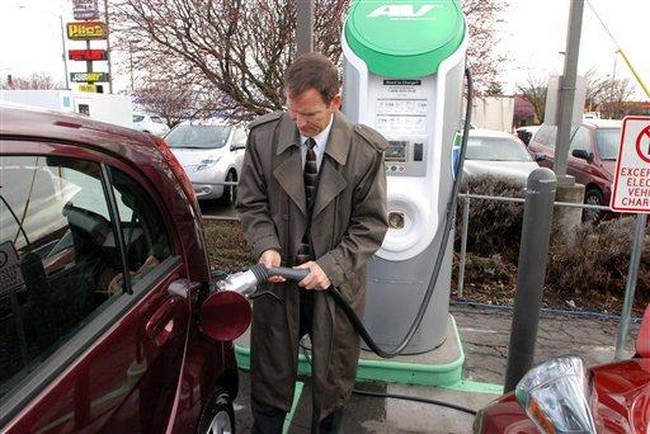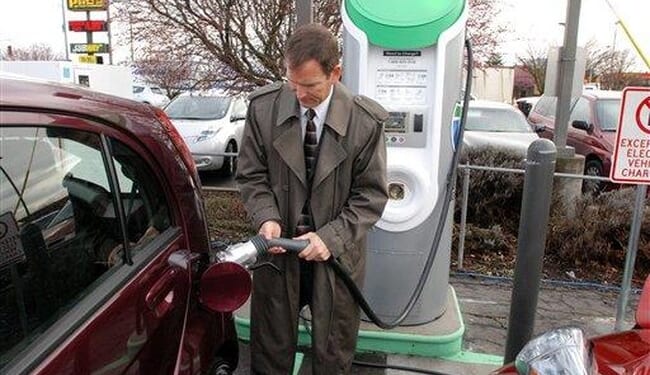
Two years ago, the Biden administration rammed through Congress a trillion-dollar infrastructure bill that contained, among other boondoggles, $7.5 billion for building EV charging stations across the country.
The administration says it’s going to need 500,000 charging stations in place by 2030 to achieve Biden’s climate goals on emissions. So far, a grand total of seven charging stations are operational.
“I think a lot of people who are watching this are getting concerned about the timeline,” said Alexander Laska, a deputy director at the Third Way think tank.
Gee! Ya think?
How many charging stations will $7.5 billion buy? The Federal Highway Administration estimates that the money will buy 20,000 stations. And Biden’s goal of 500,000 EV charging stations isn’t nearly enough.
Some estimates place the number of stations needed to adequately cover the United States for all the EVs that Biden says we have to buy at closer to a million by 2035.
“The US needs to quadruple its charging infrastructure by 2025, and grow it more than eight times by 2030,” according to a report out of S&P Global Mobility.
The White House knows full well the chaos that’s about to descend on American highways.They figure that’s the price we have to pay to save our precious planet.
“A recent study from the National Renewable Energy Lab estimated that in order to meet anticipated charging needs by 2030, a cumulative investment of between $31 and $55 billion for about 1.2 million publicly accessible charging units will be required (on top of about 28 million home charging units),” noted a White House press release from last December.
The reality is that the charging stations open at this moment are unreliable. The Wall Street Journal inspected 39 different fast charger stations in Los Angeles County and found that 40% of them had problems.
The administration recognizes this and has made the incredibly complex undertaking of building EV charging infrastructure from scratch even harder.
Part of the slow rollout is that the new chargers are expected to be held to much higher standards than previous generations of fast chargers. The United States currently has close to 10,000 “fast” charging stations in the country, of which over 2,000 are Tesla Superchargers, according to the Department of Energy. Tesla Superchargers — some of which have been opened to drivers of other vehicles — are the most reliable fast-charging systems in the country.
But many non-Tesla fast chargers have a reputation for poor performance and sketchy reliability. EV advocates have criticized Electrify America, the company created by Volkswagen after the company’s “Dieselgate” emissions scandal, for spending hundreds of millions of dollars on chargers that don’t work well. The company has said they are working to improve reliability. The data analytics company J.D. Power has estimated that only 80 percent of all charging attempts in the country are successful.
Republicans are having a field day at Biden’s expense. They sent a letter to the White House outlining their numerous concerns.
“We have significant concerns that under your efforts American taxpayer dollars are being woefully mismanaged,” wrote Cathy McMorris Rodgers (R-Wash.), Jeff Duncan (R-S.C.) and Morgan Griffith (R-Va.). “The problems with these programs continue to grow — delays in the delivery of chargers, concerns from States about labor contracting requirements and minimum operating standards for chargers,” the letter stated.
Biden administration guidance requires the new publicly funded chargers to be operational 97 percent of the time, provide 150kW of power at each charger, and be no more than one mile from the interstate, among many other requirements.
EV policy experts say those requirements are critical to building a good nationwide charging program — but also slow down the build-out of the chargers. “This funding comes with dozens of rules and requirements,” Laska said. “That is the nature of what we’re trying to accomplish.”
Can the government get it done? I doubt whether they’ll be able to build half the 500,000 charging stations they claim and make them reliable. There’s also a shortage of qualified EV mechanics, but the auto companies can probably meet their goals of training enough mechanics to service the vehicles they sell.
Biden’s new emissions rules have placed a new urgency on building EV chargers. With more than half of new car sales supposed to be EVs by 2030, there are going to be a lot of long lines at EV charging stations.












